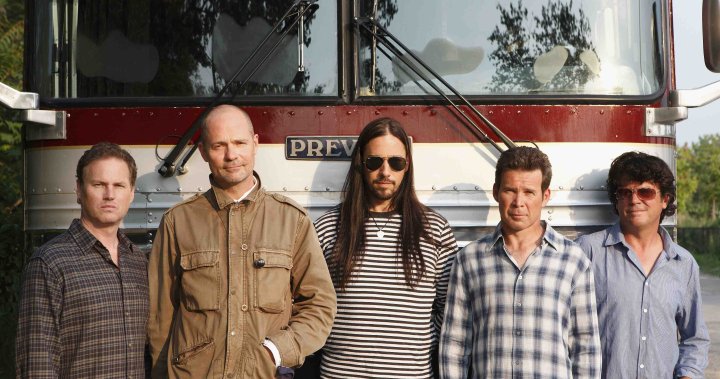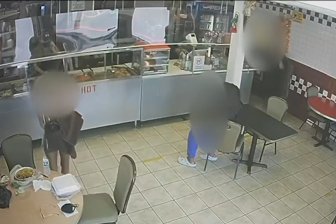After relentless touring behind their debut album, Up to Here, The Tragically Hip travelled to Kingsway Studios in New Orleans to record their second album armed with about a dozen solid songs. But once they arrived, The Hip couldn’t seem to stop writing new material. Before long they made more songs they could use for a second album.
Producer Don Smith’s style was to have the recorders rolling all the time just in case creative lightning struck. He insisted that the band record everything that they had, committing everything to reels and reels of two-inch analogue tape.
Once the sessions were complete, some tough choices had to made to narrow things down to 12 songs for an album that would eventually be called Road Apples. The album was a huge hit, reaching number one on the Canadian charts and eventually selling more than a million copies. Any decisions made about what songs to include on the album were obviously the right ones.
But what about those songs that didn’t make the cut? And what happened to the tapes from those sessions? Therein lies a fascinating story. I had a chance to talk to the four remaining members of the band and this is the oral history of the new Saskadelphia album. These interviews were edited for length and clarity.
Rob Baker: We wanted to make sure that the follow-up to Up to Here was as good or better. We went armed with a lot of songs. As is Don’s style, he’s all about the microphone placement and getting everyone set up in the right place and then just recording everything nonstop. During this time, we were just running through material. And there were a lot of songs. And there were a lot of songs we haven’t found yet.
Gord Sinclair: Johnny made a lot of trips to our storage site on a bunch of different occasions. There was one batch where he was able to find 20 of the, I think, 65 reels of two-inch tape, for Road Apples. They were labelled, so that was really easy. But we knew that there were more. They were all in different locations. The next batch involved comparing handwriting, looking for the handwriting of engineer Bruce Barris on the spine of the boxes. They weren’t labeled as The Tragically Hip. We still haven’t found 25 of them. It’s been a really crazy process.
You would think using library science they’d be easy to find. But they were spread all over. One was in a “miscellaneous” box with a number of different artists.
Johnny Fay: Some were at Richard Branson’s mastering house in California. We also found some tapes in Pennsylvania in an abandoned mine shaft, which is a big place for storing two-inch tapes because they take up a lot of real estate.
Paul Langlois: (After the Road Apples sessions), we were just on our way. We were touring all the time. Touring, recording, writing. We weren’t thinking of Road Apples outtakes whatsoever for 30 years.
Gord Sinclair: That was just of the time. It was amazing going through this process and stumbling on songs we didn’t even remember recording.
Johnny Fay: One of the guys who does Rick Rubin’s stuff said if you lift the lid on a tape box and it smells kind of acidic or vinegary, then you’ve got one go at rehabilitating the tape. You have to bake it. Otherwise, the tape can actually leave the adhesive so if you don’t get it to the right temperature and transfer it right away you might not get one listen out of it.
The oven you use looks like an Easy-Bake Oven. It sucks all the humidity out of the tape. And then you’ve got your pass at (transferring the contents) in about a 12-hour period.
Rob Baker: It has been difficult on some levels. You know, enjoyable to hear songs that were so dear to us 30 years ago and 30 years go by and you haven’t heard them. But it’s like Gord is in the room. It’s hard to hear Gord in the room and be transported back like that.
Gord Sinclair: It was like stepping into a time machine.
Read more:
How The Tragically Hip contributed to a ‘sea change’ in music, 30 years ago with ‘Road Apples’
Paul Langlois: We were up at the cottage and I had the recordings. I really didn’t want to push “play.” It was in the evening and I was just like, “I don’t know.” These songs didn’t make the record and I hadn’t heard them in 30 years. What’s this going to be like? I was expecting to be disappointed, but it was totally the opposite. Whoa. Wow. Immediately, I was back at Kingsway. “Right. This song rocked!” It was far more rocky than I expected and way better than I expected. There was an emotional reaction to it. It was pretty inspiring.
Gord Sinclair: We kind of had the tiger by the tail at that point. Up to Here had done really well and we were playing in Europe and all over North America. It was also the start of a really creative period for us when ditched the idea of individually writing and really starting to get our chops together and writing together. I think that’s part of the reason we had so many songs going in and why we continued to write in New Orleans.
Rob Baker: We had toured a lot in the preceding two years, three years, four years. And you find yourself not knowing what town you’re in. Someone made the joke, “I think we’re in Saskadelphia.” We thought it was a funny title for an album. But the U.S. record company said, “Yeah, too Canadian. We can’t do that.” That’s what led to Road Apples — which they didn’t get at all. In my parents’ generation. They would go out and play road hockey with a piece of frozen horses**t. Those are “road apples.” “We’re going to call our own album ‘Horsesh**t” and beat the critics to it.
Gord Sinclair: There are more songs. There’s a ton of stuff on tape — once we find it. Some we multitracked and worked over and over again.
Johnny Fay: There’s definitely other tapes. We know there are multiple versions of all of the songs from Road Apples. And then there are these outtakes that we didn’t end up using. There are a couple of tapes that are definitely missing. Maybe some will resurface at a later date, but who knows?
Paul Langlois: With Fully Completely, I think we’ve released everything. But we recorded a lot. Like a lot. I can’t even imagine … like at our studio (The Bathhouse outside of Kingston), depending on the record, there’s a lot of extra stuff. We’ll really have to focus on a record at a time. It takes physically finding stuff and for everyone to be thinking, “OK, what did we record?” Probably the later in our career it got, the less we remember. But that’s why we’re doing this. It honours Gord (Downie) because he was a big part of it. He was there. It was the five of us. This was our first run at it and everyone’s happy with it. The quest will continue.
Johnny Fay: The legacy is going to live beyond us. We created this thing and it’s just going to live on. If we can get everything in order, it can just kind of come out. And we’re going to be able to tell our story way better than anyone else because we were there. That’s what’s important to us.
Paul Langlois: There’s been talk of a book for years now. It is an idea floating around. Eventually, probably, it’ll happen.
Saskadelphia tracklisting:
- Ouch (Not included on Road Apples because of its similarity in style and feel to Twist My Arm and Cordelia.)
- Not Necessary (A little too close to Little Bones.)
- Montreal (Live) (The song dates back to the Road Apples era, but this is a live recording from a gig at the Bell Centre in December 2000.)
- Crack My Spine Like a Whip (A former set opener and encore favourite.)
- Just as Well (Circulated as a bootleg for decades.)
- Reformed Baptist Blues (One of the oldest songs in entire The Tragically Hip canon. This is the only recording of the song in existence.)
—
Alan Cross is a broadcaster with Q107 and 102.1 the Edge and a commentator for Global News.
Subscribe to Alan’s Ongoing History of New Music Podcast now on Apple Podcast or Google Play
© 2021 Global News, a division of Corus Entertainment Inc.



